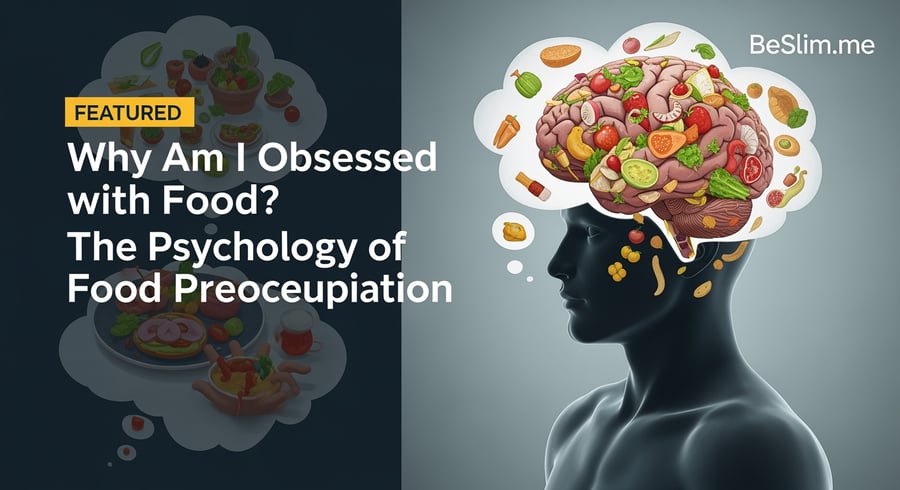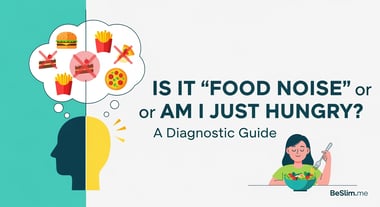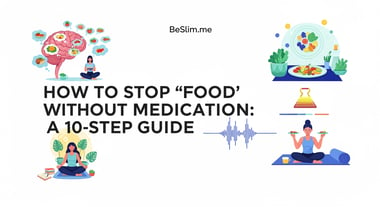Hello, I'm Master Kim, your Behavioral Psychologist and Solution Consultant at BeSlim.me. If you're reading this, you might be feeling overwhelmed by constant thoughts about food—what to eat next, how much you've already eaten, or that nagging urge that just won't quit. You're not alone in this struggle; it's a common experience for many on their wellness journey. This obsession can feel exhausting and frustrating, but it's completely normal and often rooted in deeper psychological and biological patterns. In this Q&A explainer, we'll dive into the "why" behind food preoccupation, backed by behavioral science, and equip you with practical steps to regain control. Remember, understanding is the first step toward change, and I'm here to guide you with empathy and evidence-based solutions.
Why Do I Feel Obsessed with Food? Understanding the Root Causes
Food obsession, or preoccupation with eating, isn't just about willpower—it's a complex interplay of psychological, behavioral, and hormonal factors. Let's break it down in this Q&A format to address common questions and provide clear, science-based explanations.
What Psychological Factors Contribute to Food Obsession?
Many people experience food obsession as a form of rumination, where thoughts about food loop endlessly in the mind. This often stems from habit loops, a concept from behavioral psychology where cues (like stress or boredom) trigger cravings, leading to eating as a reward, which reinforces the cycle. For instance, if you've associated snacking with comfort during tough times, your brain wires itself to seek food as a quick emotional fix.
Scientifically, this ties into the brain's reward system, involving dopamine—a neurotransmitter that surges during pleasurable activities like eating. When food thoughts dominate, it's often because restrictive dieting or negative self-talk creates a scarcity mindset, making food seem even more alluring. Research shows that psychological stress can amplify food cravings by altering brain pathways, leading to preoccupation as the mind fixates on forbidden or comforting foods. In essence, it's not greed or lack of discipline; it's your brain's adaptive response to unmet needs.
How Do Behavioral Patterns Play a Role?
Behaviorally, food obsession can arise from conditioned responses built over time. Think of it as a well-worn path in your daily routine: skipping breakfast might lead to intense hunger thoughts by midday, or using food to cope with emotions creates a dependency. This is explained by operant conditioning, where behaviors are strengthened by rewards. If eating distracts from anxiety, you're more likely to repeat it, even if it leads to guilt afterward.
A key driver is willpower depletion, or ego depletion, where decision fatigue from daily life leaves you vulnerable to impulsive thoughts. For example, after a long workday, your mental resources are low, making it harder to resist obsessing over that pint of ice cream in the freezer. Studies indicate that habitual behaviors like emotional eating are linked to reduced self-control under stress, turning fleeting thoughts into persistent obsessions. The good news? These patterns are malleable with targeted interventions.
Are There Hormonal Reasons Behind This Obsession?
Absolutely—hormones like cortisol (the stress hormone) and ghrelin (the hunger hormone) can hijack your focus on food. Chronic stress elevates cortisol, which not only increases appetite but also directs cravings toward high-calorie foods for quick energy. This is an evolutionary holdover: in times of scarcity, our ancestors needed to prioritize food-seeking for survival.
When you're sleep-deprived or dieting restrictively, ghrelin spikes, signaling intense hunger that manifests as obsessive thoughts. Meanwhile, leptin (the satiety hormone) may drop, making you feel unsatisfied even after eating. According to experts, hormonal imbalances from stress and poor sleep can exacerbate food preoccupation, creating a vicious cycle where obsession leads to overeating, which then fuels more hormonal disruption. Understanding this biological basis helps demystify why food feels like it's "calling" to you—it's not a personal failing, but a signal to address underlying imbalances.
In summary, food obsession often combines these elements: psychological rumination, behavioral habits, and hormonal signals. By recognizing them, you can shift from self-blame to strategic action. If this resonates, know that it's a hurdle many overcome with the right tools.
How Can I Overcome Food Obsession? Actionable Strategies
Now that we've diagnosed the "why," let's move to solutions. Drawing from behavioral science, here are five practical, step-by-step strategies to break free from food preoccupation. Each is designed for immediate implementation, with examples for real-life application. Focus on sustainability—small, consistent changes build lasting habits.
Strategy 1: Identify and Disrupt Habit Loops
Habit loops (cue → craving → response → reward) are at the heart of obsession. To break them, start by mapping yours.
- Track your triggers: For one week, note when food thoughts arise—what time, emotion, or situation? Use a simple journal or app.
- Interrupt the cue: Replace the trigger with a non-food alternative. If boredom cues snacking, set a timer for a 5-minute walk instead.
- Reframe the reward: After disrupting, reward yourself positively, like listening to a favorite podcast.
Example: Sarah noticed her evening food obsession spiked during TV time (cue: relaxation). She disrupted it by preparing herbal tea first, reducing thoughts by 50% within days. This draws from habit formation research, promoting gradual rewiring without overwhelm.
Strategy 2: Practice Mindful Awareness to Reduce Rumination
Mindfulness counters psychological fixation by bringing attention to the present, reducing dopamine-driven loops.
- Daily check-ins: Twice a day, pause for 2 minutes to observe your thoughts without judgment—label them as "just a thought" about food.
- Body scan technique: Sit quietly and scan your body for hunger signals versus emotional urges. Ask: "Am I truly hungry, or is this stress?"
- Grounding exercise: When obsessed, name five things you see, hear, and feel to shift focus.
Scenario: During a stressful workday, Mike used body scans to realize his cookie craving was anxiety, not hunger. He opted for deep breathing, curbing the obsession. This approach is supported by mindfulness studies showing reduced emotional eating.
Strategy 3: Balance Hormones Through Lifestyle Tweaks
Address hormonal drivers like cortisol and ghrelin with targeted habits for better regulation.
- Prioritize sleep: Aim for 7-9 hours nightly; establish a wind-down routine like dimming lights an hour before bed.
- Incorporate stress reducers: Practice 10 minutes of yoga or meditation daily to lower cortisol.
- Eat balanced meals: Include protein and fiber in every meal to stabilize ghrelin—e.g., eggs with veggies for breakfast.
Example: Lisa, plagued by nighttime obsessions, improved sleep hygiene and added morning walks, noticing fewer cravings as hormones balanced. Remember, consistency is key for hormonal harmony.
Strategy 4: Build Willpower Reserves with Micro-Habits
Combat depletion by strengthening self-control through small wins, avoiding all-or-nothing dieting.
- Start small: Choose one easy habit, like drinking water before meals, to build momentum.
- Schedule decisions: Plan meals in advance to reduce daily fatigue—prep a weekly menu.
- Replenish energy: Take short breaks for activities like stretching to recharge mental resources.
Illustration: Tom, exhausted from work, pre-planned lunches, freeing mental space and diminishing obsessive planning. This fosters sustainable change by conserving willpower.
Strategy 5: Cultivate a Positive Food Relationship
Shift from scarcity to abundance mindset to lessen preoccupation.
- Permission-based eating: Allow occasional treats without guilt to reduce forbidden fruit allure.
- Gratitude practice: After meals, note one positive aspect, like nourishment provided.
- Seek support: Join a community or consult a professional for accountability.
Case: Emily reframed treats as enjoyable rather than "bad," which quieted her constant thoughts. This promotes long-term behavioral shifts rooted in self-compassion.
Implementing these strategies one at a time can create profound change. Track progress weekly and adjust as needed—sustainable habits trump quick fixes.
Final Encouragement: Change Is Within Reach
You've taken a brave step by exploring this—remember, food obsession doesn't define you; it's a pattern you can reshape with patience and science-backed tools. Many have walked this path and emerged with a healthier, more balanced relationship with food. Be kind to yourself along the way; progress may be gradual, but it's possible. If you need personalized guidance, BeSlim.me is here to support your journey. You've got this!
References
Medical Disclaimer
The content on this website is for informational and educational purposes only. It is not intended as medical advice and should not be relied upon as a substitute for consultations with qualified healthcare professionals who are familiar with your individual medical needs. Always seek the advice of your physician or other qualified healthcare provider with any questions you may have regarding a medical condition. Never disregard professional medical advice or delay in seeking it because of something you have read on this website.




